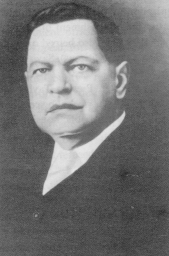 Preston Taylor
was born in Shreveport, Louisiana, on November 7, 1849, of slave parents.
Taylor served as a drummer boy in the Union army during the siege of Richmond,
Virginia. After the Civil War, he traveled throughout the North, but settled
at Mount Sterling, Kentucky, as a minister. Deeply affected by the exclusion
of Negroes from local Reconstruction projects, Taylor secured a contract
to build several sections of the Big Sandy Railway from Mount Sterling
to Richmond, Virginia. After this successful business venture and extensive
work in the Christian (Disciples of Christ) Church, he moved to Nashville.
Preston Taylor
was born in Shreveport, Louisiana, on November 7, 1849, of slave parents.
Taylor served as a drummer boy in the Union army during the siege of Richmond,
Virginia. After the Civil War, he traveled throughout the North, but settled
at Mount Sterling, Kentucky, as a minister. Deeply affected by the exclusion
of Negroes from local Reconstruction projects, Taylor secured a contract
to build several sections of the Big Sandy Railway from Mount Sterling
to Richmond, Virginia. After this successful business venture and extensive
work in the Christian (Disciples of Christ) Church, he moved to Nashville.
Taylor arrived in Nashville around 1884. By the early years of the twentieth century, he had become one of Nashville's most influential black business and religious leaders. He married Georgia Gordon, one of the original Fisk Jubilee Singers. Their son, Preston, died as an infant in 1891, and Mrs. Taylor died in 1913. Taylor then married Ida D. Mallory.
In 1887, Taylor purchased thirty-seven acres of land near "Buttermilk Ridge" at Elm Hill Pike and Spence Lane. Upon this dairy land, in 1888, he established Nashville's second oldest cemetery for blacks, Greenwood. Also in 1888, he founded Taylor Funeral Company at 449 North Cherry Street (now Fourth Avenue).
In 1905, he extended his holdings with the purchase of thirty-seven and a half acres of land near the corner of Spence Lane and Lebanon Road, for the purpose of establishing the Greenwood Recreational Park for Negroes. The park was elaborate, with fountains, gardens, shows, good stands, a baseball park, rides, band stands, and special attractions. The annual State Colored Fair was held there, where at times some 14,000 persons attended in a single day. His horse-drawn "pleasure wagons" met the electric streetcars at the Green-Fairfield Street turnaround and took the customers to the Lebanon Road entrance of the park. Mysterious fires threatened twice to destroy the park. Otherwise, there was no challenge to Greenwood Park until the first city-owned park for Negroes, Hadley Park, was opened in July of 1912. Taylor's business ventures made him a wealthy man.
After moving to Nashville, Taylor became minister of the Gay Street Christian Church, founded in 1855 as the Negro congregation of the white Vine Street First Christian Church. In 1891, due to a controversy, the Reverend Taylor and a part of the congregation left the Gay Street Colored Christian Church and established a church in a doctor's office building on Spruce Street (now Eighth Avenue). In 1903, the congregation completed a church building on Lea Avenue near Lafayette Street. After Taylor's death, the two congregations united into today's Gay-Lea Christian Church, located on Osage Street.
Among his other activities were the organization in 1917 of the National Colored Christian Missionary Convention and involvement in the establishment of Tennessee State Agricultural and Industrial State Normal College in 1909. He also helped organize several other Nashville black businesses, including the One Cent (Citizens) Savings and Trust Company Bank.
As a businessman, undertaker, and influential minister, Preston Taylor was one of Nashville's most powerful black leaders. Upon his death in 1931, week-long ceremonies were held before his interment in Greenwood Cemetery. In 1951, a public housing project was named in his honor.